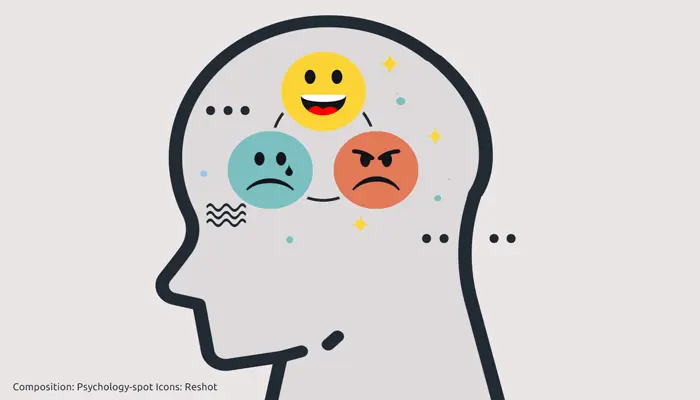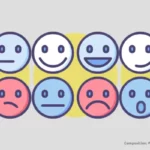
Little by little, mental disorders have been shedding the halo of stigma with which they were surrounded for centuries. New generations speak more openly about mental health and terms such as “trauma”, “depression” or “anxiety” have become part of the popular vocabulary. However, this popularization also contains a danger: trivializing mental disorders.
Convinced that we must be happy at all costs, we run the risk of pathologizing emotions. However, not everything is mental illness. Sadness is not depression and stress is not anxiety. We need to stop pathologizing every unpleasant or uncomfortable emotion we experience, because that way we are only adding the weight of worry and anxiety to perfectly normal emotional reactions.
Semantic inflation and trivialization of mental disorders
Being aware of what we are feeling is essential. In fact, emotional granularity helps us better manage our emotional states. However, there is a chance that we confuse completely natural emotional reactions with really serious mood disorders.
A study carried out at the University of Melbourne found that due to the popularization of psychological concepts – such as trauma, depression and anxiety – they “Have acquired more general meanings and have come to refer to a broader range of events and experiences.” These psychologists found that growing public attention and awareness about mental health is at the root of this kind of “semantic inflation,” as they defined it.
As a result, they indicate that “Everyday emotional experiences are increasingly pathologized, such that the concepts of ‘depression’ and ‘anxiety’ have expanded to include subclinical experiences of sadness and worry.” In other words, by not understanding the differences between sadness and depression, we end up classifying normal emotional reactions as a mental disorder.
In fact, it is natural for us to feel sad when we lose a loved one, and that does not mean we suffer from major depression. Just as it is normal for us to feel tense, nervous or even stressed before our first job or important project, but that does not mean that we suffer generalized anxiety. It is also normal that from time to time we are so tired that we do not want to get out of bed, while other times we are bursting with so much energy that we could take on the world without that meaning that we suffer from bipolar disorder.
Regardless of what positive thinking gurus claim, it is normal to occasionally experience sadness, anger, irritability, grief, or many other feelings that are classified as “negative.” Those emotions may be uncomfortable or unpleasant. We may wish they would pass quickly. But that does not make them a psychological disorder.
The ability to experience emotions without pathologizing them
Our society increasingly oscillates between emotional analgesia and hedonism, immersed in an effort to exorcise all those emotions considered “negative.” And, while it is true that feeling sad, depressed or disappointed is not pleasant, in certain circumstances these emotions are perfectly normal and even adaptive reactions to what we are experiencing.
When we rush to diagnose ourselves – or the others – we are harming ourselves. We harm ourselves because we prevent ourselves from experiencing our feelings normally. We get scared and reject those emotions. We try to find a pathological reason why we feel this way, perhaps in the hope that a medication can make those feelings go away soon.
That’s not healthy.
Panicking at the first sign of difficult feelings can turn those emotions into something much bigger than they are. We can equate emotions and feelings with the clouds in the sky. If we don’t hold on to them, they will simply disappear as they came, even the most threatening ones. But if we pay excessive attention to them and pathologize them, even clouds that brought a simple drizzle can become storm clouds.
We can’t be good all the time. Experiencing feelings such as anger, sadness, boredom, fear, indignation or even unhappiness is completely normal and we should not be ashamed of it.
Depression, for example, began to take off in the 1960s and 1970s, curiously coinciding with the discovery and marketing of the first antidepressant, imipramine. Nowadays, subject to the imperative to be happy, there is a risk that all people who do not feel well will gravitate towards “depression”, becoming a real epidemic worldwide.
Obviously, that doesn’t mean we shouldn’t pay attention to our emotions or seek psychological help when we feel bad. But we must learn to move between the subtle line that exists between normality and pathology. There are emotions that, although they may be uncomfortable, are important for our own mental health, even if it seems contradictory.
Sadness, for example, promotes reflection after loss. It encourages us to stop and focus our gaze on ourselves to facilitate acceptance. The decrease in physiological arousal gives us space for slow thinking and gives us the time we need to update our cognitive structures; that is, adapt to the loss, weigh our actions, review our goals and modify our plans.
So the next time you’re going through a difficult time and you’re tempted to label it a mental disorder, you should pause and ask yourself: Is this a normal reaction to what’s happening to me? Would most people feel this way under these circumstances? Does what I feel prevent me from doing my daily tasks?
Use these questions as a guide. Psychological disorders such as depression or anxiety not only worsen over time, but also make daily functioning greatly difficult, causing enormous discomfort.
When you feel bad, give yourself some space and time to explore those feelings and reactions to difficult experiences without experiencing the urge to label them. Chances are you’ll discover their message and come away stronger from that experience.
References:
Xiao, Y. et. Al. (2023) Have the concepts of ‘anxiety’ and ‘depression’ been normalized or pathologized? A corpus study of historical semantic change. PLoS One; 18(6): e0288027.
Steinberg, H. & Himmerich, H. (2012) Roland Kuhn—100th Birthday of an Innovator of Clinical Psychopharmacology. Psychopharmacol Bull; 45(1): 48–50.



